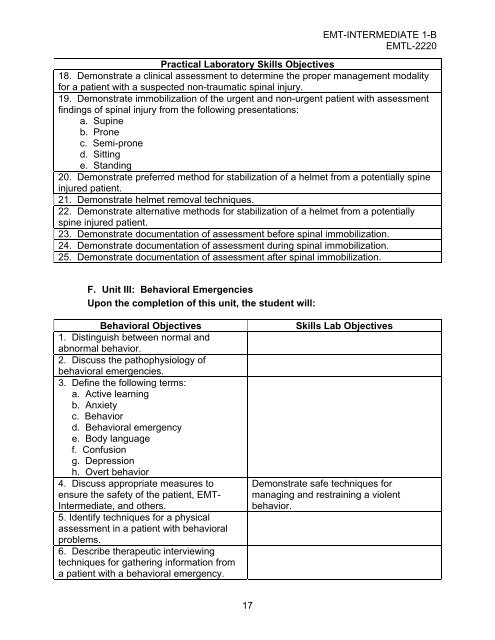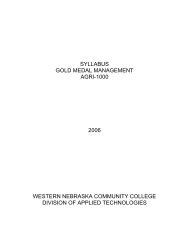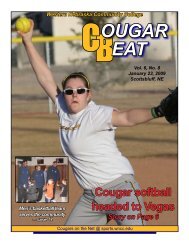View Current Syllabus - Western Nebraska Community College
View Current Syllabus - Western Nebraska Community College
View Current Syllabus - Western Nebraska Community College
Create successful ePaper yourself
Turn your PDF publications into a flip-book with our unique Google optimized e-Paper software.
EMT-INTERMEDIATE 1-B<br />
EMTL-2220<br />
Practical Laboratory Skills Objectives<br />
18. Demonstrate a clinical assessment to determine the proper management modality<br />
for a patient with a suspected non-traumatic spinal injury.<br />
19. Demonstrate immobilization of the urgent and non-urgent patient with assessment<br />
findings of spinal injury from the following presentations:<br />
a. Supine<br />
b. Prone<br />
c. Semi-prone<br />
d. Sitting<br />
e. Standing<br />
20. Demonstrate preferred method for stabilization of a helmet from a potentially spine<br />
injured patient.<br />
21. Demonstrate helmet removal techniques.<br />
22. Demonstrate alternative methods for stabilization of a helmet from a potentially<br />
spine injured patient.<br />
23. Demonstrate documentation of assessment before spinal immobilization.<br />
24. Demonstrate documentation of assessment during spinal immobilization.<br />
25. Demonstrate documentation of assessment after spinal immobilization.<br />
F. Unit III: Behavioral Emergencies<br />
Upon the completion of this unit, the student will:<br />
Behavioral Objectives<br />
1. Distinguish between normal and<br />
abnormal behavior.<br />
2. Discuss the pathophysiology of<br />
behavioral emergencies.<br />
3. Define the following terms:<br />
a. Active learning<br />
b. Anxiety<br />
c. Behavior<br />
d. Behavioral emergency<br />
e. Body language<br />
f. Confusion<br />
g. Depression<br />
h. Overt behavior<br />
4. Discuss appropriate measures to<br />
ensure the safety of the patient, EMT-<br />
Intermediate, and others.<br />
5. Identify techniques for a physical<br />
assessment in a patient with behavioral<br />
problems.<br />
6. Describe therapeutic interviewing<br />
techniques for gathering information from<br />
a patient with a behavioral emergency.<br />
Skills Lab Objectives<br />
Demonstrate safe techniques for<br />
managing and restraining a violent<br />
behavior.<br />
17
















